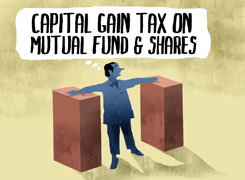I’m from Pune. I’m 48 with two children. Should I invest in ELSS funds to save tax, or should I focus on traditional instruments like PPF and fixed deposits?
Ans: Deciding between Equity Linked Savings Schemes (ELSS) and traditional investment instruments like Public Provident Fund (PPF) and Fixed Deposits (FDs) depends on various factors, including your financial goals, risk tolerance, investment horizon, and tax-saving needs. Here's a comprehensive comparison to help you make an informed decision:
1. Understanding the Investment Options
a. ELSS (Equity Linked Savings Schemes)
• Nature: Equity Mutual Funds with a tax-saving component.
• Lock-In Period: 3 years (shortest among tax-saving instruments under Section 80C).
• Returns: Potentially higher returns as they are invested in equities, but subject to market volatility.
• Tax Benefits: Investments up to ?1.5 lakh per annum are eligible for deduction under Section 80C.
• Liquidity: Relatively higher liquidity post the lock-in period compared to other tax-saving instruments.
b. PPF (Public Provident Fund)
• Nature: Government-backed long-term savings scheme.
• Lock-In Period: 15 years.
• Returns: Moderate and tax-free returns, revised periodically by the government (typically around 7-8% p.a.).
• Tax Benefits: Investments up to ?1.5 lakh per annum qualify for deduction under Section 80C. The interest earned and the maturity amount are tax-free.
• Safety: Very low risk as it's backed by the government.
c. Fixed Deposits (FDs)
• Nature: Fixed-term investment with banks or post offices.
• Lock-In Period: Varies; typically no lock-in for regular FDs, but tax-saving FDs have a 5-year lock-in.
• Returns: Fixed interest rates, generally lower than ELSS but higher than savings accounts. Current rates vary but are around 5-7% p.a. for tax-saving FDs.
• Tax Benefits: Investments up to ?1.5 lakh in tax-saving FDs qualify for deduction under Section 80C.
• Safety: Low risk, especially with reputable banks.
2. Factors to Consider
a. Risk Appetite
• ELSS: Suitable if you are willing to take on market-related risks for potentially higher returns.
• PPF & FDs: Ideal for conservative investors seeking capital protection and guaranteed returns.
b. Investment Horizon
• ELSS: 3-year lock-in period, but generally better for medium to long-term goals.
• PPF: 15-year commitment, suitable for long-term goals like retirement or children's education.
• FDs: Flexible, but tax-saving FDs require a 5-year lock-in, suitable for medium-term goals.
c. Returns
• ELSS: Historically, ELSS funds have outperformed PPF and FDs over the long term, but with higher volatility.
• PPF: Offers stable and tax-free returns, which are beneficial in a low-interest-rate environment.
• FDs: Provide guaranteed returns, useful for capital preservation but may lag behind inflation and equity returns over time.
d. Tax Efficiency
• ELSS: Returns are subject to capital gains tax. Short-term (if held for less than 3 years) gains are taxed as per your income slab, while long-term gains (exceeding ?1 lakh) are taxed at 10%.
• PPF: Completely tax-free returns.
• FDs: Interest earned is taxable as per your income slab, which can reduce the effective returns.
3. Recommendations Based on Your Profile
Given that you are 48 years old with two children, your investment strategy should balance between growth and safety, considering your proximity to retirement and financial responsibilities.
a. Diversified Approach
A balanced portfolio that includes both ELSS and traditional instruments like PPF and FDs can help mitigate risks while aiming for reasonable growth.
• ELSS: Allocate a portion (e.g., 30-40%) to ELSS to benefit from potential equity growth, which can help in wealth accumulation for retirement or funding children's education.
• PPF: Continue contributing to PPF for long-term, stable, and tax-free returns. Given its 15-year tenure, it aligns well with retirement planning.
• FDs: Use FDs for short to medium-term goals or as a part of your emergency fund, ensuring liquidity and capital preservation.
b. Consider Your Tax Bracket
If you are in a higher tax bracket, maximizing tax-saving instruments under Section 80C can provide significant tax relief. ELSS, PPF, and tax-saving FDs all qualify, so diversifying among them can spread risk and optimize tax benefits.
c. Assess Liquidity Needs
Ensure you have sufficient liquidity for unforeseen expenses. While ELSS has a shorter lock-in compared to PPF, both still tie up funds for a few years. Maintain a separate emergency fund in a more liquid form, such as a savings account or liquid mutual funds.
d. Review Your Risk Tolerance
At 48, with retirement possibly 10-20 years away, a moderate risk appetite might be suitable. ELSS can offer growth potential, while PPF and FDs provide stability.
4. Additional Considerations
• Emergency Fund: Ensure you have 6-12 months' worth of expenses saved in a highly liquid form.
• Insurance: Adequate health and life insurance are crucial, especially with dependents.
• Debt Management: If you have any high-interest debt, prioritize paying it off before locking funds in fixed instruments.
5. Consult a Financial Advisor
While the above guidelines provide a general framework, it's advisable to consult with a certified financial planner or advisor. They can offer personalized advice tailored to your specific financial situation, goals, and risk tolerance.
Finally, both ELSS and traditional instruments like PPF and FDs have their unique advantages. A diversified investment strategy that leverages the strengths of each can help you achieve a balanced portfolio, ensuring both growth and security. Given your age and family responsibilities, striking the right balance between risk and safety is essential for long-term financial well-being.


























